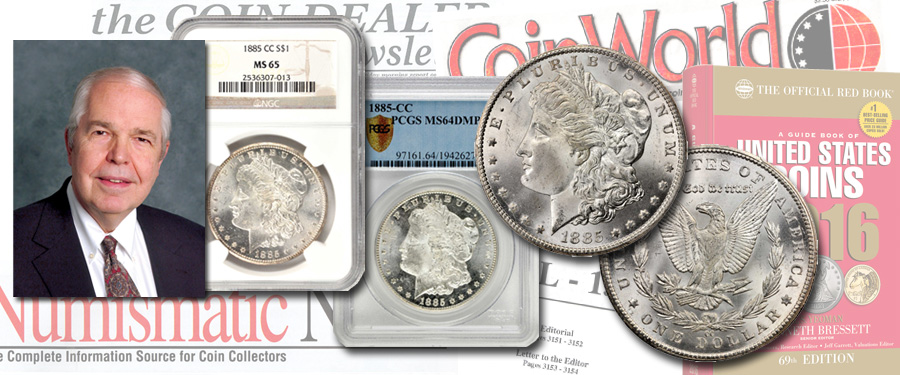
In issue #11 of The Coin Collector (a newspaper published by Bowers and Merena in the 1990s and 2000s), I wrote a lead article titled, “On Being a Smart Buyer” that is reprinted here.
How does one be a smart coin buyer? By smart buyer I am not referring to investing, future price predictions, etc. I am targeting how you can make the best, most intelligent use of your coin-buying dollars right now, whether you are buying well-worn large cents or Proof double eagles.
As a dealer since 1953, I have seen a lot of people come and go in the coin market. In the process I have come to know why some buyers are smarter – much smarter – than others.
I share my observations with you:
Key to Success No. 1
Although this might sound trite, it is a fact that those who make the most money on their collections or coin investments are those who know the most. How do you learn about coins? The easiest, cheapest and most effective (isn’t it ideal that these come together) way is to read about coins.
If I were to suggest to you that before you buy a single Morgan silver dollar of the type minted from 1878 to 1921, you should become a well-read expert, you would probably think that the advice was good, but for you not practical.
There is an easier way. Pick just one variety, say an 1885-CC Morgan dollar. Consult whatever references you have on hand, which might include the Guide Book, The Coin Dealer Newsletter, Numismatic News, Coins, COINage, Coin World, and others. What is the mintage? What is the weight of the coin? Who designed it? In what grades are 1885-CC dollars usually found (you may be surprised to learn that VG-8 coins are great rarities compared to MS-65 coins!), what are the market values?
By focusing on just one coin, you can become an expert on an 1885-CC dollar, or other coin of your choice in a half hour or less? Of course, you won’t know everything about the 1885-CC, but you will know a heck of a lot. And, reading about a coin can be fun.
Now, it’s time to buy an 1885-CC dollar (or other coin you have studied). What should you look for? Here are some of the things I look for when I seek to buy a nice 1885-CC for our inventory.
Key to Success No. 2
Is it in the technical grade (MS-63, MS-64, etc.) claimed by the seller? If it is certified (in a “slab”) do I agree with the grade marked? If I don’t agree, I reject the coin on the spot. If I do agree, I proceed to the next item:
Key to Success No. 3
Is it well struck? Whether a coin is well struck depends upon its variety. In the case of the 1885-CC dollar, well struck coins are available in the market, and you should not buy one otherwise. (However, if you were studying the 1891-O Morgan dollar, it would be good to know that this is an issue that nearly always comes weakly struck; knowledge, again.)
Key to Success No. 4
Does it look “nice”? No matter what technical grade it might be in, if it does not have an attractive appearance, then I won’t buy it. I will only buy coins that I enjoy viewing and displaying as part of my collection. Many mistakes are made by those who simply look at the grade on a slab and pay their money, especially if it is bargain priced. To my way of thinking, an attractive aesthetically appealing MS-63 is worth more and is nicer to own than a dull, unattractive MS-64. Personally, I like Morgan dollars with deep, frosty luster, and with brilliant or attractively lightly toned surfaces.
Key to Success No. 5
Is the price reasonable? By reasonable I don’t mean bargain priced. In coins, as in every other walk of life, you get what you pay for. When buying a coin, I will nearly always pay more than published “bid” prices if the coin is choice. On the other hand, I would not pay half of the “bid” price if the coin is ugly; in fact, I wouldn’t want it at all! Coins are not created equal. Examine 10 different coins all marked with the same grade, and you can easily rank them in order of quality. What I look for is so-called “high end” coins.
When buying coins, a good rule is to pay a fair price. Often, this means paying a bit more for quality. However, when time comes for you to sell (and everyone sells sometime), your penchant for quality will pay off. Perhaps you remember our auction sales of the Norweb Collection, in which numerous pieces realized multiples of catalog values, because the quality was superb.
Summary
You see, buying smart is basically applying common sense, and doing at least a small bit of studying.





